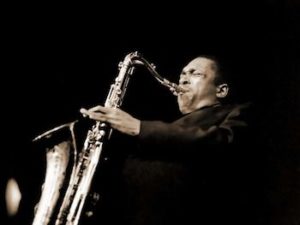
John Coltrane
In 1926, jazz saxophone player John Coltrane was born on this date. He was a Black composer, small group leader, and combo leader.
Coltrane was born in Hamlet, NC, and grew up in nearby High Point. He began playing the clarinet in a community band at 13 and switched to the alto saxophone during his final year of high school. In 1945, he was drafted into the United States Navy, eventually serving most of his two-year term with a Navy band stationed in Hawaii.
In 1947, he switched to the tenor saxophone and toured with alto saxophonist Eddie "Cleanhead" Vinson. He joined the trumpeter Miles Davis's group in 1955, beginning an important career phase. During his periods with Davis, Coltrane gained an international reputation as a tenor saxophonist. His high notes had an intense, emotional quality, and his melodies were extremely ornate and usually played without vibrato. After leaving Davis’s quintet, Coltrane formed his own quartet and began playing the soprano and the tenor saxophone.
During the early 1960s, Coltrane and drummer Elvin Jones developed a highly energetic and interactive way of playing jazz. While improvising in one key, he often introduced notes from another key. Soon he moved into free jazz, a style in which musicians sometimes create unusual sounds with their instruments. A deeply religious man, he recorded several albums of his religious compositions, the most famous being A Love Supreme. Coltrane recorded with Eric Dolphy, Sun Ra, Johnny Hartman, McCoy Tyner, and others.
By late 1965, Coltrane was regularly augmenting his group with Pharoah Sanders and other free jazz musicians. Rashied Ali joined the group as a second drummer, ending the quartet. Claiming he could not hear himself over the two drummers, Tyner left the band shortly after the recording of Meditations. Jones left in early 1966, dissatisfied with sharing drumming duties with Rashid Ali.
There is speculation that in 1965, Coltrane began using LSD, informing the "cosmic" transcendence of his late period. After the departure of Tyner and Jones, Coltrane led a quintet with Pharaoh Sanders on tenor saxophone, his wife Alice on piano, Jimmy Garrison on bass, and Ali on drums. Nat Hentoff described Coltrane and Sanders as "speaking in tongues." When touring, the group was known for playing long versions of their repertoire, many stretching beyond 30 minutes to an hour. In concert, solos by band members often extended beyond fifteen minutes.
In the 1960s, Coltrane won several polls conducted in the United States and in Japan. After his death, the National Academy of the Recording Arts and Sciences (NARAS) honored Coltrane’s memory with a Grammy and lifetime achievement awards. Coltrane inspired many to play the soprano saxophone, an instrument rarely used in jazz until he began playing it.
John Coltrane, a major figure in the evolution of the jazz styles known as bebop and free jazz, died on July 17, 1967.
Jazz: A History of the New York Scene
Samuel Charters and Leonard Kunstadt
(Doubleday, Garden City, N.Y., 1962)